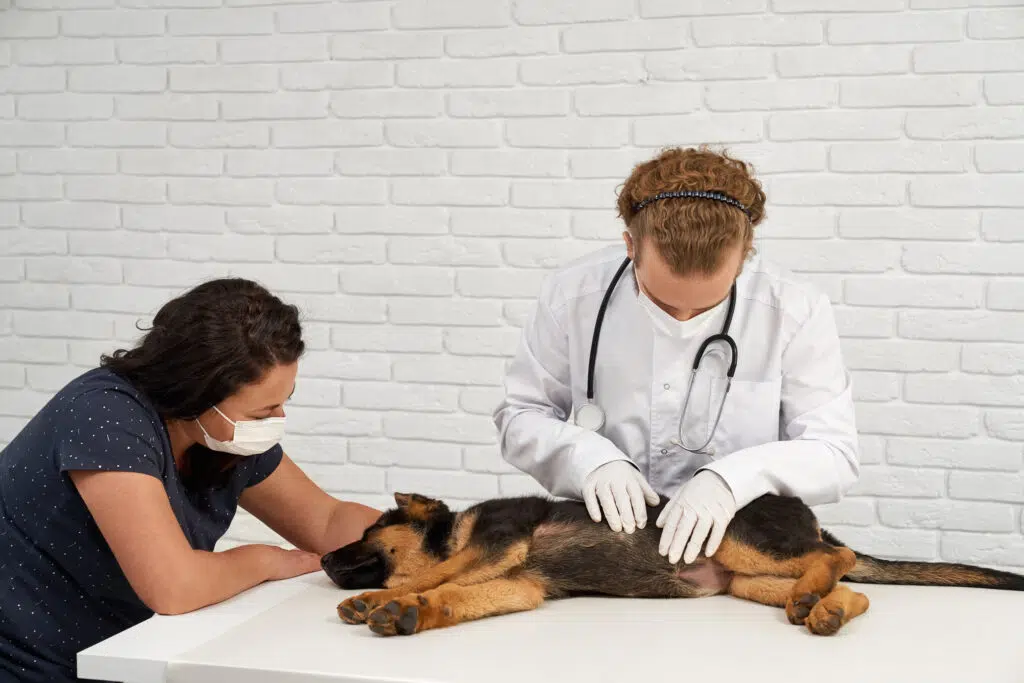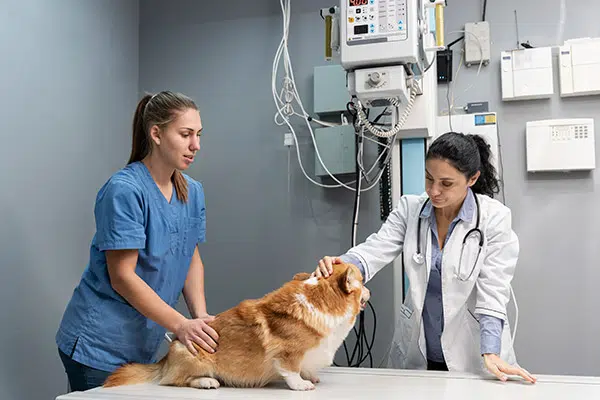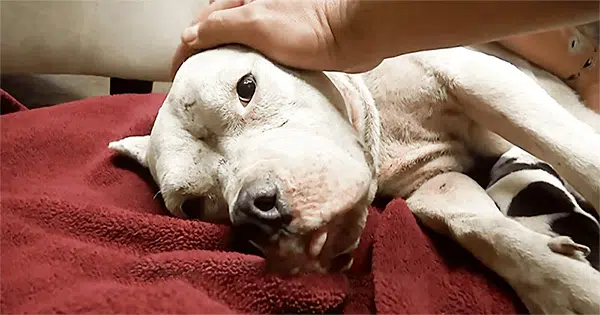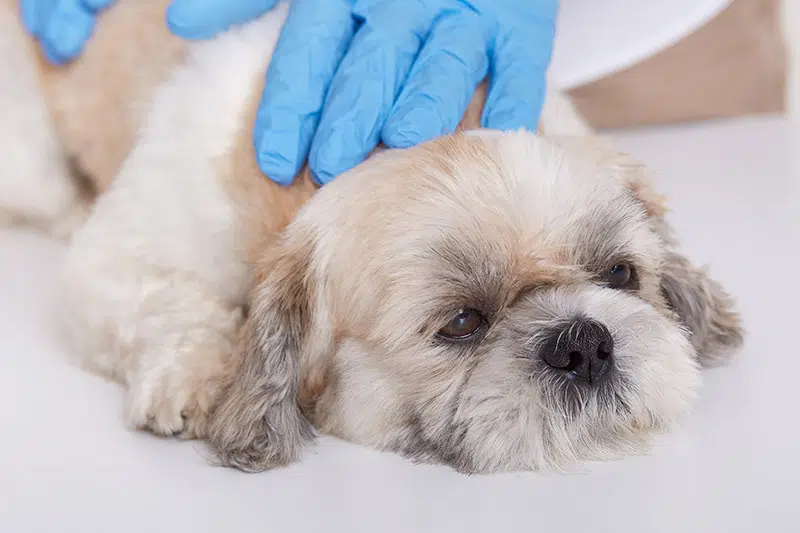Heart trouble is a common issue among canines, especially as they age.
It can cause a lot of distress, both for the dogs and their owners, as it can be hard to watch.
Once they notice the signs, many dog owners wonder if the diagnosis is the end of the line.
Others begin immediately looking for ways to treat heart failure.
The question among most, though, is how to know when it’s time to let go.
To make that decision, it’s crucial to understand more about heart failure, how it impacts dogs, and what options are available.
What is Canine Congestive Heart Failure?

At its core, congestive heart failure (CHF) in dogs means that their blood is not being pumped adequately throughout the body.
Like a human, a dog’s body survives by the blood that gets pumped through its veins.
Every part of the body relies on that blood to keep it alive, well, and healthy.
When the blood does not reach those parts, different parts of the body suffer.
Additionally, even if that blood does not go to the proper places, it still goes somewhere, leading to medical issues.
Where it goes and the problems it causes depends on the type of CHF the dog has.
Types of CHF in Dogs
There are two types of congestive heart failure in dogs: left-sided and right-sided.

Left-Sided Congestive Heart Failure
Left-sided congestive heart failure (LS-CHF), the most common type, is when blood leaks back through the mitral valve, into the left atrium, and then into the lungs.
It leads to the dog having a hard time breathing and a lot of coughing.
Essentially, the blood is causing the pup to drown in his own fluids, which can be agonizing.
Right-Sided Congestive Heart Failure
Right-sided congestive heart failure (RS-CHF) is when the blood that the right ventricle pushes to move through the lungs leaks into the tricuspid valve.
It then moves back into the right atrium, backs up into the body’s main circulation, and accumulates in the abdomen.
RS-CHF typically leads to swollen limbs and malfunctioning organs, leading to a great deal of pain and discomfort.
Commone Causes of Congestive Heart Failure in Dogs

There are many reasons why your dog may be suffering from congestive heart failure.
Some of the most common ones include old age, infections, injuries, poor diet, and lack of exercise.
Some breeds are believed to be predisposed to the condition due to genetics.
Some of these include:
- Cocker Spaniels
- Boxers
- Doberman Pinschers
- German Shepherds
- Rottweilers
- Pomeranians
- Poodles
- Dachsunds
- Beagles
- Collies
- Great Danes
- Labrador Retrievers
It is important to note, though, that any breed can be subject to CHF.

Some other causes of canine CHF include:
- Tumors
- Pregnancy
- High blood pressure
- Heartworm disease
- Defects of the heart walls
Symptoms of CHF in Dogs
The most common symptoms of CHF in dogs include the following:
- Abnormal or constant coughing
- Trouble moving, playing, or exercising
- Lethargy, weakness, and exhaustion
- Abdominal distention
- Fainting or collapsing
- Difficult, rapid, or abnormal breathing
- Blue or gray gums
- Sudden death
Most dogs with CHF cough more at night when trying to rest or early in the morning before moving.
The cough often eases or lessens when the dog is active as the body is better able to pump the blood through the system.
How Long Can a Dog Live With Congestive Heart Failure?

It is possible for dogs with CHF to carry on living comfortably for some time, from a few months to several years.
The length of time depends on a number of factors, such as the stage the dog is in when diagnosed and how it gets treated.
There are no guarantees, of course. Generally speaking, though, the earlier CHF is diagnosed, the better the chances of a more desirable outcome.
Treatment Options for CHF in Dogs
When you take your dog to the vet, they will run a series of tests for a proper diagnosis.
These include:
- Urine and blood tests
- Echocardiogram
- Electrocardiogram
- Measure blood pressure
- Chest x-rays
In some cases, your dog might need to stay in the vet hospital to be monitored for a couple of days.
After completing all required tests and monitoring, your vet can explain the extent of the condition and give you a course of treatment.
Medical treatment typically includes a combination of medications.

The type of medications will depend on the cause of the CHF.
For example, if heartworm disease is the culprit, part of the medication will be specifically for the treatment of heartworms.
Other medications might help fight fluid buildup, regulate the heart’s rhythm, or improve the overall heart function.
Again, your vet will determine the best combination according to the current issues.
However, those medications may be altered over time to improve the course of treatment.
You can also help at home to treat CHF or prevent it.
Most importantly, be sure you are getting your dog to all of its appointments with your vet.
From the time they are babies to the end of their life, a vet can help ensure your beloved pet attains the maximum quality of life.
Vets do this through vaccinations, detecting potential issues early, and educating pet parents.
It is also up to you to ensure that your dog maintains a healthy weight.
Feed him a high-quality and nutritious diet, and keep him active as often as possible.
If you are unsure about the diet, consult the vet about what is safe.

When to Consider Euthanasia
Deciding to euthanize a pet is difficult, and no one wants to do it before their dog’s time.
Though nothing can make the process painless, there are some things to consider that can help smooth the journey a little.
There’s no such thing as “perfect.”
If you are waiting on the perfect time to euthanize, you will be waiting forever.
There is no perfect or right time to do it.
There will be pain, grief, and doubt regardless of whether you do it now, tomorrow, or three years from now.
How is your dog’s quality of life? Is he able to walk and play comfortably?
Does he eat regularly? Is his breathing labored?
Does he get up and greet you on most days?
While euthanizing your dog may be painful, it is also painful watching them suffer.

If you notice a major decline in his quality of life, you have to ask yourself whether keeping him alive is causing him misery.
If the answer is “Yes,” it is likely time to make an appointment with your vet.
Is your family suffering?
As difficult as it can be to lose someone you love, it can sometimes be more difficult watching their decline.
When families watch a loved one suffer and die slowly, it is often an emotional burden they do not know how to bear.
When that loved one does pass, the family – while certainly sad – feels a sense of relief that their family member is no longer suffering.
Knowing that he or she has moved on to a more peaceful existence provides a sense of closure.
You have to ask yourself if your family would your family be able to cope better with their grief if they were no longer watching your dog suffer.
If you are unsure, talk it through.
Ask everyone – adults and children alike – how they feel.
Have you spoken to your vet?
CHF does not have to be the end of the line.
There are many dogs that can be treated, and – in some cases – the CHF can be reversed.
However, the key is in speaking with your vet.

He or she can tell you how serious the condition is, whether there is any treatment that can help and whether the condition has progressed too far.
It is always best to speak to your vet prior to making any decisions, as it can help you make a more informed one.
Ultimately, the decision is yours, and it does not have to be made in haste.
Take a little time to learn all you can, speak to someone you trust, and truly consider the situation.

My little pittie has CHF. He has been on Vetmidin and diuretics for 6 months and has improved markedly, but the last month or so he has abdominal distension (though not coughing). I took him in to the vet and they tried to drain his abdomen of fluid, but only got a bit out this time (first time was 6 months ago when they got more fluid out). Due to his bulging abdomen he has slowed down quite a bit and lays on his belly a lot. Doesn’t appear to be in any pain, not coughing, still has a smile on his face a lot-but I’m worried about the weight on his back from the belly distension. I want to give him (and myself) every minute of quality life he has coming, but I suspect I’ll have to make the decision soon before he has a back issue. Your article helped me a lot-many thanks. I’ll talk with my vet tomorrow and try and determine the best course of action. I hate this, but I owe him my very best-he’s been good company to me, especially during the last year of pandemic.
It’s clear you’re a wonderful pet owner . My dog, too, is suffering from CHF, and I understand your desire to do the best thing. Know that we are thinking of you in this difficult time.
My 16 yr old mini dachshund, Susie, has the swollen belly. I have an appointment tomorrow to have some fluid drained. Susie has a hard time getting around because of petella subluxation in the hind legs and arthritis. She can no longer go up the ramp to the bed. She is still eating and greets me with a wagging tail but most of the time her tail is between her legs. She wants to be with me 24-7. I am concerned about her suffering and will discuss this with the vet tomorrow. It will kill me when she goes but her well being is more important. My husband died in April and my older cat, Misha, died a month ago. I still have 3 healthy cats that love me, but Susie is my last dog. I am 78 years old and have back problems. 2021 has been a very difficult year for me.
Very sorry to hear. ❤
My 14 yr old terrier mix, Cesar has CHF. He is on enalapril and pimobendan. He was never put on a diuretic. Now his abdomen is extremely distended and yesterday he had fluid in his right hind leg and foot. When I asked about draining fluid from his abdomen I was told by the vet assistant that it would just fill up again within 30 minutes. Cesar has a good appetite, but he is so uncomfortable. I don’t want to have him euthanized although I know I may have to make that choice. My question is would it be humane to take him off of his heart medications or would it cause him more distress.
70s is when we know a lot about life and know how to give love to our animal companions as well as value their love. Making this decision is going to not be easy but it is part of what we do in this guardianship we have chosen. At this age we may know how to grieve but it’s never easier. Sending gentlest thoughts to you.
I am right there with you. You have been through so much. Stay strong.
How can I ease his cough. Its picked up a lot this past week. Other than coughing. They last for about 5 to ten minutes every hour now. Other than that hes pretty normal. Hes 14 and had a total hip replacement when he was seven.
Have you established with your vet why he coughs? If it is congestive heart failure I’m using a canister of oxygen for athletes called Boost. It has attached nose piece. When I hear my girl cough I give her a few breaths. It had helped a lot and with her 3 cardiac meds things are going along at this point.
This may sound crazy – I sing a gentle lullaby my dog whilst calmly stroking her. It works every time. We couldn’t believe it the first time. She has an enormously enlarged heart which is squashing her trachea so she’s in the wars. It’s heartbreaking isn’t it. A lullaby is worth a try, or “don’t worry, be happy” . That calms my little dog too
My heart goes out to all pet parents, We just had our 11 yr old Dalmatian put down this past Thursday. The house sounds so empty without him banging the bell on the back door, to go out. He started coughing a month ago, so we took him in to our Vet, had blood work done and a full physical. Good weight, eating & drinking, playing, laying on Dads lap (big as he was) and our Vet couldn’t find anything wrong. OK, a month later (still coughing off & on) but he seemed OK. Thursday at 1:30 AM he woke me up, coughing…..really bad, and I saw his breathing was very labored. Our Vet couldn’t get him in, but they said to take him to the animal ER, which we did. They put oxygen on him, immediately, and did xrays. He was in CHF, and had a nodule in his lung, which the Vet said was usually cancer??? How do dogs get lung cancer? We answered all the usual questions, he was eating, drinking, no loose stools, etc. He even launched himself off the back porch to run & bark at the Beagle girls next door that morning…..being so short of breath. We asked if we could take him home, and the Vet said that was a really bad idea. We knew what we had to do. We just cried.
They were so compassionate at that animal ER…..they even put him into a body bag so we could take him home & bury him. Had our Vet diagnosed him a month earllier the outcome would have been the same. We got an extra month to love on him, and we’re so thankful for that extra time. All 3 of the Dalmatians we’ve had & loved over the past 29 yrs were all such loving, gentle natured creatures. We had a female Golden Retriever which we put down exactly 1 yr ago, almost to the day. She was 14, and just the sweetest girl, ever! She also had CHF & liver cancer. She never complained, wagged that tail all the time, and was eating & drinking as usual. The weight loss gave it away. 40 lbs lighter in just a few months. Nothing could be done. Again, we just loved on her and tried to keep our daily routine. She became incontinent & started vomiting. It was time. Our Dalmatian was so lost without her. He grieved right along with us.
Our hearts are broken, and we can’t stop crying (we’re seniors) but I know we’ll heal up, and be on the search or another Dalmatian baby. Excellent companions, and so loyal!
I’d love to have another Golden, but something tells me it’ll be a Dal.
Thank you for allowing me to share…….and to all who have fur babies that are dealing with health issues….GOD be with you & them.
I’m 68 and my precious dog has been in heart for a year. Several years ago he was put on Vetemedinl abd seed a cardiologist regularly. I live alone. Milo is my only companion. The day my husband of 42 years told me he’s gay and moved out is the day I got Milo. Thru 5 major back surgeries and COVID, Milo has been by my side. He keeps me alive. But to watch him gag, cough, and breathe heavily is sad. When should I put him down. Just the thought makes me cry hysterically. We have a relationship that vets tell me, they have never seen. I just don’t know what to do.
I am so sorry for what you are going through, Our little dog is 16 years old and really declining this year. He is the child I never had. Just the thought of his time to go breaks my heart.Please know my thoughts are with you and as hard as it is, I hope you will find peace when he passes, and when it is the right time, be open to love another amazing dog again. When it is time that new loving pet will help you to heal…just keep loving him.
Seniors have such a hard time losing their pet.
I just found out that gabby(dog) has CHF and it is killing me. She started Lasix on Tuesday. It was wonderful to see her go outside to talk to the cats. She was even barking. The good, good Lord gives us the wonderful friends in our lives. We all need to thank him for this great opportunety to share our love and theirs. I’m 67, a widow, when my husband passed, I got Gabbrelia to be my angel to lead me through my grief. She has helped a whole, I wouldn’t have made it without her.
I just lost my Max to CHF two days ago. I am completely heartbroken and cant stop crying. . He was diagnosed 2 years ago and has done well on Enelapril, Vetmedin and Furosemide. I am grateful for a relatively healthy 2 years w my Max. Recently he began coughing in the middle of the night every night, exhibiting labored breathing, would eat but go immediately back to bed as if exhausted, seemed unable to get confortable, exhibited incontinence, had ongoing episodes of diarrhea, and was going blind and bumping into things. Our vet said it was time when he began refusing food. God bless our sweet Max who will live forever in my heart. He was a gentle, sweet, lovable, happy and adorable boy.
I lost my 14 yr old English Bully Emmy Lou a month ago. She exhibited the exact symptoms as your fur baby did. Making that final decision to have her euthanized was the hardest decision I have ever had to make. I knew it was the kindest thing for her but I didn’t know how to let go.
I know how u feel. So sorry. I lost my rescue. Rott. Reese Pieces last fri. Nov. 11. 2022. I had one month with her after diagnosed. Came home on probiotics. Lasix. Antibiotics. She couldn’t get up last 2 days. Stop eating. Waited too long. She suffered. No vvegts had openings. Or not euthanize because not previous client.
I’m so sorry for your loss. Today I had to put my sweet chihuahua Snooki to sleep. She was diagnosed with chf a week ago. Before that she was perfectly fine and showed no symptoms. She would have turned 13 years old in January. My heart is shattered
I have a Deer Chihuahua, JD, who is 16 al.ost 17 I think and he was diagnosed with CHF 4 mo ago and was put on medications. Every now and then he collapses and howls a little like he is in pain or scared….I just don’t know what he is feeling and it kills me. He has had 3 of those collapsing/seizing episodes in the past three days. He is walking pretty stiff and slow but he still wants to be near me, eats well, poops and pee well and even barks and wants to play a little but nothing like before. I dont know if he is in pain but those “episodes” really seem to hurt him. He is starting to cough a little now as well. He can’t handle the car ride to vet, it stresses him out SO bad and I can’t afford more x-rays, echo cardigans and whatnot and besides whats the point…they told me there is nothing they can do besides the meds he is on. If I decide to call someone to my house to put him down, he will just be sitting on my lap, seemingly happy….how do I make that decision. How do I say goodbye when he is seemingly happy to be with me but yet he is suffering at times♀️.. I keep praying God will take him in his sleep but its not happening…..idk what to do
We are in the same situation with Sweet Love Ellie our 15 year old Pom. In the past few weeks she had 3 spells were she would cry out, and then passed out, we managed to bring her back, give her meds, and few hours later, she was up and about again. She eats good, drinks well, takes hee meds well, but her breathing is laboured. This is so difficukt to watch, and when she lets out that awful sound as if to say to help her, my heart breaks. Last night she had the worst fainting spell after letting out a horrible whinning noise and passed out. We thought that was it, but managed to bring her back, gave her heart meds, and few hours later, she was going again. If there was a Vet open at 6am, I’m sure we would have put her down. Seeing her moving around and eating and barking, is making my heart ache, and making that dreadful desicion is killing us. My Vet told us last week to think about putting her down, but it is so gut wrenching not having her here is making it so difficult. Im watching her as I’m typing, and dhe is sleeping, but laboured breathing.. I’m torn and heart broken.
I know this Mike, I lost a dog a month ago, he was old and died peacefully at home, then, my other dog, Monty, my little soul mate that hasn’t left my side in 13 years, started fainting. He fainted twice, that I know about, and one night, three weeks ago, he woke me up really crying, as though he’d been hurt, but then he was fine. I did nothing about this. Over the last three weeks, Monty really slowed down, I thought he felt a bit podgy in his abdomen, but couldn’t be sure. He was still pretty active and eating. Over the week leading up to Easter, he became slower and slower, and seemed to become fatter and fatter. He stopped following me around, started sleeping a lot. This was not like him. Over the Easter weekend, he slept, and got even bigger. I took him to the vets on Tuesday 2nd April, 2024, expecting to be told he had diabetes or water retention; the vet told me he had heart failure, and that it was his time. I asked if there was anything I could do, or if I could have done anything differently, and he said no. Monty was euthanised on Tuesday at 11.15. My heart is breaking, I am experiencing guilt, grief, I can’t eat, I can’t sleep, I am questioning the decision; how could he leave me, he was only 13, aren’t chihuahuas supposed to have long lives. I cry constantly, I have his blanket in bed with me, I have his photo next to my bed, and I talk to him. I buried him in the garden next to his brother Gizmo. I feel like I have lost a child, and believe me, I am a rational, professional woman. I just can’t get over the suddeness of this; I’d assumed Monty would be with me for many more years. The more we love Mike, the more we grieve. I couldn’t risk him having a painful death, that is why I took the painful decision to have him put to sleep straight away. But, I am just not ready to let him go yet. My heart is breaking. I hope everything is ok with your little dog. Jayne x
I’m dealing with the same thing, the same symptoms with my Boston Terrier Lizzie. She’s 14 years old and it’s breaking my heart watching her decline daily. Some days she seems to rebound A little but then she’s back to labored breathing! In the past week,she’s coughing A lot more and doesn’t seem to feel well at all so Im probably going to have to make the decision about her quality of life although I’m definitely not ready to let her go! But I have to do what’s right for her! Thanks for listening! God bless you and your sweet Ellie
I just lost my Gracie this morning from a 1 1/2 years battle with CHF. 17 years and one month old. She was a Yorkie that gave as much love and joy as I did for her. As much of a blessing it has been to have that precious girl in my life; the pain and quilt of having to make the decision for euthanasia was a struggle that’s left me with quilt and all the “what ifs” and “should haves”. What a journey we find ourselves on in this life.